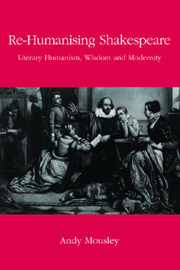Introduction: Literary Humanism, Wisdom and Modernity
Published online by Cambridge University Press: 12 September 2012
Summary
Can Shakespeare help us with the question of how to live? If Philip Yancey's What's So Amazing about Grace? (1997) is at all representative of its type, then the answer from today's spiritual self-help genre is ‘yes’. This is how Yancey concludes his exegesis of Jesus' parable of the unforgiving servant:
God has granted us a terrible agency: by denying forgiveness to others, we are in effect determining them unworthy of God's forgiveness, and thus so are we. In some mysterious way, divine forgiveness depends on us.
Shakespeare put it succinctly in Merchant of Venice: ‘How shalt thou hope for mercy, rendering none?’
It is to Shakespeare as sage that Yancey quite naturally turns here, on the assumption that great writers are ‘great’ on account of their eloquent encapsulation of durable truths. Turning to the world of professional literary criticism, it might be reasonable to suppose that the answer to my opening question is altogether otherwise. Surely the combined forces of scepticism, historicism and specialisation have put paid to the faith in the universally valid wisdom of sages? ‘Criticism for the past two generations’, writes Margreta de Grazia in ‘The Ideology of Superfluous Things: King Lear as Period Piece’ (1996), ‘has tended to situate Shakespeare in history rather than assume his universality’. Although de Grazia wrote this some time ago, universals are still distrusted, still equated with what Simon Barker in New Casebooks: Shakespeare's Problem Plays (2005) refers to as the ‘traditional criticism’ which ‘modern theory’ has superseded.
- Type
- Chapter
- Information
- Re-Humanising ShakespeareLiterary Humanism Wisdom and Modernity, pp. 1 - 30Publisher: Edinburgh University PressPrint publication year: 2007



